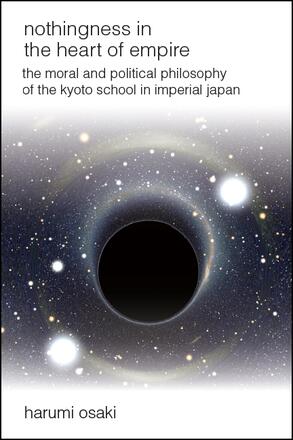
Nothingness in the Heart of Empire
The Moral and Political Philosophy of the Kyoto School in Imperial Japan
Alternative formats available from:
Reveals the complicity between the Kyoto School’s moral and political philosophy, based on the school’s founder Nishida Kitarō’s metaphysics of nothingness, and Japanese imperialism.
Description
In the field of philosophy, the common view of philosophy as an essentially Western discipline persists even today, while non-Western philosophy tends to be undervalued and not investigated seriously. In the field of Japanese studies, in turn, research on Japanese philosophy tends to be reduced to a matter of projecting existing stereotypes of alleged Japanese cultural uniqueness through the reading of texts. In Nothingness in the Heart of Empire, Harumi Osaki resists both these tendencies. She closely interprets the wartime discourses of the Kyoto School, a group of modern Japanese philosophers who drew upon East Asian traditions as well as Western philosophy. Her book lucidly delves into the non-Western forms of rationality articulated in such discourses, and reveals the problems inherent in them as the result of these philosophers' engagements in Japan's wartime situation, without cloaking these problems under the pretense of "Japanese cultural uniqueness. " In addition, in a manner reminiscent of the controversy surrounding Martin Heidegger's involvement with Nazi Germany, the book elucidates the political implications of the morality upheld by the Kyoto School and its underlying metaphysics. As such, this book urges dialogue beyond the divide between Western and non-Western philosophies, and beyond the separation between "lofty" philosophy and "common" politics.
Harumi Osaki is an independent scholar who received her PhD in contemporary French thought from Hitotsubashi University in 2003 and went on to complete a second doctorate in Japanese philosophy from McGill University in 2016.
Reviews
"Harumi Osaki has written an important book. " — Monumenta Nipponica
"…a well-documented and conscientiously researched piece of scholarship that will gather a dedicated readership in the academic cycles of Japanese philosophy/religion. " — Religious Studies Review
"Osaki's book is certainly a thought-provoking and solid approach to the Kyoto School philosophy. Her perspective includes both theoretical and practical (political and ethical) themes, programmatically aiming at finding out their connections and synergies. From such a perspective, her approach is uncommon and very welcome … the book is an important contribution to the study of Japanese modern thought. " — Journal of Buddhist Ethics
"In this powerful book, Harumi Osaki announces herself as a major voice in Kyoto School scholarship. Drawing extensively on the work of Naoki Sakai, Osaki indicates that the problems of Western universalism and non-Western (Asian, Japanese) particularism are in fact but two sides of the same coin. This important insight, when put in the service of her considerable philosophical erudition, has allowed her to write what to my knowledge is the most intelligent, probing book on Nishida and the Kyoto School in the English language. " — Richard F. Calichman, author of Beyond Nation: Time, Writing, and Community in the Work of Abe Kōbō